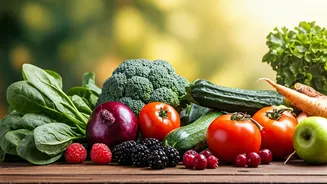Initial Considerations
Embarking on a vegan journey requires a shift in perspective, moving away from conventional dietary habits. It's more than just cutting out meat; it's
about eliminating all animal products, which includes dairy, eggs, and often honey. Understanding the reasons behind this lifestyle is crucial. Many vegans are driven by ethical concerns, advocating for animal welfare and opposing factory farming practices. Others focus on the environmental benefits, as the production of animal products has a significant ecological footprint. Additionally, health motivations play a key role, with some individuals aiming to reduce their risk of certain diseases through a plant-based diet. Exploring these diverse motivations will provide a solid foundation for making an informed decision about adopting a vegan lifestyle, ensuring it aligns with your personal values and goals. Consider your values. What compels you to consider such a change? Think about the implications of these changes, and the impact it could have on your own wellbeing.
Food and Nutrition
Once you've decided to go vegan, the next step involves transitioning your diet to be entirely plant-based. The focus shifts towards incorporating a wide range of fruits, vegetables, legumes, grains, nuts, and seeds. A well-planned vegan diet is packed with nutrients, but careful attention is needed to ensure all essential elements are covered. Protein, often associated with meat, can be easily obtained from sources such as tofu, tempeh, lentils, and chickpeas. Vitamin B12, crucial for nerve function and red blood cell production, is not naturally found in plant-based foods, so it's important to supplement or consume foods fortified with B12. Iron, essential for transporting oxygen in the blood, can be sourced from spinach, fortified cereals, and dried fruits, but it's important to consume these with vitamin C to enhance absorption. Calcium, important for bone health, is available in fortified plant milks, tofu, and leafy green vegetables. Moreover, a balanced vegan diet emphasizes the importance of planning meals and snacks to avoid nutrient deficiencies.
Practical Transitioning
Making the switch to a vegan diet doesn't require drastic, sudden changes. Instead, it's often more sustainable and successful to gradually integrate vegan choices into your existing eating habits. Start by experimenting with vegan versions of your favorite dishes. Look for plant-based milk alternatives such as soy, almond, or oat milk. Swap meat-based ingredients with plant-based meat substitutes, like tofu or tempeh, which are versatile and easy to incorporate into various recipes. Explore vegetarian/vegan-friendly restaurants and consider their menu options. Familiarize yourself with labels and ingredient lists, as even seemingly vegetarian products may contain hidden animal-derived ingredients. Cooking at home is crucial to vegan meals, which is made easier by resources like cookbooks, online recipes, and vegan bloggers who offer diverse options. By taking things step-by-step and embracing new recipes, you will find transitioning to veganism is an enjoyable journey.
Navigating Social Situations
Eating out or attending social gatherings presents unique challenges for vegans. Planning and communicating ahead of time can make these situations easier. When dining out, call the restaurant in advance to inquire about vegan options or modifications they can provide. Inform hosts or organizers of parties and events about your dietary requirements, offering to bring a dish to share. This ensures you always have options available. Don't feel pressured to explain your choices to everyone. Be prepared with some basic information about veganism to answer questions. However, remember that your choices are personal, and you don't need to justify them to anyone. Embrace the opportunity to educate and inspire others about the benefits of plant-based eating when the conversation arises. Ultimately, focus on enjoying the social experience while remaining true to your values and dietary preferences.
Long-Term Considerations
Sustaining a vegan lifestyle involves long-term planning and adaptability. It's about ongoing learning, researching new foods, and refining your eating habits to meet your needs. Regularly assess your health and nutritional intake. Schedule check-ups with a doctor or a registered dietitian to monitor your nutrient levels, particularly B12, iron, and calcium. Stay informed about the latest research on vegan nutrition and food trends. A well-rounded vegan lifestyle extends beyond food, encompassing lifestyle changes, such as choosing animal-friendly clothing and avoiding products tested on animals. Join vegan communities, either online or in person. Sharing your experiences and seeking support from like-minded individuals can be a powerful way to stay motivated. By embracing the principles of continuous learning and adaptation, you can build a sustainable and fulfilling vegan journey.














